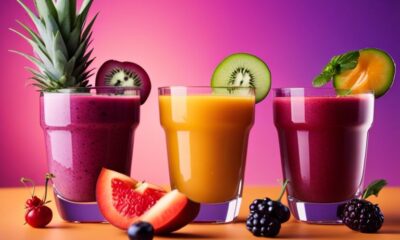Health & Society
The Ultimate Guide To Pre And Post-Workout Nutrition

Nutrition is key to fueling your body for optimal performance and recovery during your workouts. What you eat before and after exercise can make a significant difference in your energy levels, muscle recovery, and overall results. In this comprehensive guide, you will learn the important nutrition tips to maximize your pre and post-workout meals, helping you achieve your fitness goals effectively.
1. Pre-workout: Eat carbs and protein 1-2 hours before.
2. Stay hydrated by drinking water before and after your workout.
3. Avoid heavy, high-fat meals that can slow digestion.
4. During workout, consider a sports drink for hydration and energy.
5. Post-workout: Refuel with protein for muscle repair and growth.
6. Include carbs to replenish glycogen stores for energy recovery.
Understanding the Importance of Pre-Workout Nutrition
While you may focus on what you eat after a workout, what you consume before your exercise routine is just as crucial. Pre-workout nutrition plays a vital role in providing you with the energy and nutrients needed to perform at your best during your workout session. It helps to fuel your muscles and optimize your performance while also aiding in muscle recovery post-exercise.
Factors Affecting Pre-Workout Nutrition
Even before you decide on what to eat before a workout, there are various factors you need to consider that can influence your pre-workout nutrition choices. These factors include your fitness goals, the intensity and duration of your workout, any dietary restrictions, and your personal preferences.
- Timing: When and how soon you eat before a workout
- Macronutrient balance: The ratio of carbs, protein, and fat in your pre-workout meal
- Food choices: Selecting the right type of foods that are easily digestible and provide sustained energy
- Hydration: Ensuring you are well-hydrated before starting your workout
After addressing these factors, you can tailor your pre-workout nutrition to suit your individual needs and optimize your performance.
Pros and Cons of Different Pre-Workout Meal Timings
| Meal Timing | Pros and Cons |
| 1-2 hours before | Pro: Provides sustained energy throughout the workout Con: May not be suitable for early morning workouts |
| 30 minutes before | Pro: Quick energy boost Con: May lead to indigestion or discomfort during the workout |
| Intermittent fasting | Pro: Can promote fat loss Con: May result in decreased performance for some individuals |
Pre-workout nutrition meal timings can significantly impact your exercise performance. Choose the timing that works best for you based on your schedule, preferences, and how your body responds to the meal.
Types of Pre-Workout Nutrition
One of the crucial aspects of your workout routine is your pre-workout nutrition. The right macronutrient-rich foods, meal replacement shakes and supplements, and snacks and beverages can make a significant difference in your performance at the gym.
Macronutrient-Rich Foods
Little adjustments in your pre-workout nutrition can lead to big improvements in your training sessions. Protein-rich foods like chicken, eggs, and Greek yogurt can help build and repair muscle tissue. Carbohydrate-rich foods such as fruits, oats, and sweet potatoes provide the necessary energy for your workouts. Healthy fats from sources like nuts and avocados can help sustain your energy levels throughout your session.
| Protein | Chicken, Eggs, Greek Yogurt |
| Carbohydrates | Fruits, Oats, Sweet Potatoes |
| Healthy Fats | Nuts, Avocados |
Meal Replacement Shakes and Supplements
Replacement options like meal replacement shakes and protein bars can be convenient and effective sources of nutrition before your workout. These products are designed to provide a balance of macronutrients tailored to support your exercise performance and recovery.
This comprehensive approach ensures you get the imperative nutrients your body needs to enhance your workout results. Remember to choose products that are low in added sugars and artificial ingredients for optimal performance.
Snacks and Beverages for Optimal Energy
Foods rich in fast-digesting carbohydrates like bananas and granola bars can give you a quick energy boost before your workout. Hydration is also crucial, so be sure to include water, coconut water, or sports drinks in your pre-workout routine to stay hydrated and energized.
PreWorkout, focusing on whole foods and natural sources of energy will provide you with a sustained release of nutrients during your training session, helping you perform at your best.
The Ultimate Guide To Pre And Post-Workout Nutrition: Step-by-Step Guide to Pre-Workout Meal Planning
To ensure you are fueling your body properly before a workout, it’s important to plan your pre-workout meals carefully. Below is a step-by-step guide to help you create the perfect pre-workout meal plan tailored to your fitness goals and needs.
Calculating Your Caloric Needs
| If you are looking to optimize your performance during a workout, it’s crucial to determine your caloric needs based on your activity level and fitness goals. | Caloric Needs Calculator – Use an online calculator to estimate how many calories you need per day based on your age, weight, height, and activity level. This will give you a starting point for planning your pre-workout meals. |
Choosing the Right Foods for Your Workout Type
| PreWorkout you engage in strength training, focusing on protein-rich foods like chicken, eggs, or Greek yogurt can help support muscle growth and repair. | Cardio Workouts – Opt for complex carbohydrates like oats, sweet potatoes, or whole grains to provide long-lasting energy for your cardio sessions. |
StepbyStep understanding your workout type will help you select the right foods that can enhance your performance and help you achieve your fitness goals more effectively.
Sample Meal Plans for Different Fitness Goals
There’s no one-size-fits-all approach to pre-workout nutrition, as it varies depending on your fitness goals. Whether you aim to build muscle, increase endurance, or lose weight, there are specific meal plans to support each goal.
Meal prepping can be a game-changer in ensuring you have the right nutrients at the right time to fuel your workouts and optimize your performance. By following these sample meal plans tailored to your fitness goals, you can take your workouts to the next level and see results faster.
Tips for Optimizing Pre-Workout Digestion
For optimal performance during your workouts, it’s crucial to pay attention to your pre-workout nutrition and how it affects your digestion. Here are some tips to help you optimize your pre-workout digestion:
- Aim to eat a balanced meal 1-2 hours before your workout, focusing on complex carbohydrates, lean proteins, and healthy fats to provide sustained energy.
- Avoid foods high in saturated fats and simple sugars right before your workout, as they can lead to digestive discomfort and sluggishness.
- Stay hydrated by drinking water before and during your workout to aid in digestion and help regulate your body temperature.
Any discomfort during your workout can greatly impact your performance, so paying attention to your pre-workout digestion is crucial for a successful exercise session.
Managing Food Intolerances and Sensitivities
Clearly, if you have known food intolerances or sensitivities, it’s important to avoid those foods before your workout to prevent digestive issues. Pay attention to how your body reacts to certain foods and adjust your pre-workout meals accordingly. Additionally, consider incorporating digestive enzymes or probiotic supplements to aid in digestion and reduce any discomfort.
Strategies for Reducing Bloating and Discomfort
To optimize your pre-workout digestion and minimize bloating and discomfort, try eating smaller meals closer to your workout time. Additionally, focus on easily digestible foods such as smoothies or rice cakes with nut butter. Avoid foods high in fiber or artificial sweeteners that can cause gastrointestinal distress.
Optimizing your pre-workout digestion is crucial for fueling your body properly and enhancing your performance during exercise. By following these tips and paying attention to how your body responds, you can ensure a comfortable and energized workout session.
The Role of Probiotics in Gut Health
To support your gut health and improve digestion, consider incorporating probiotic-rich foods such as yogurt, kefir, and sauerkraut into your diet. Probiotics help maintain a healthy balance of gut bacteria, which is crucial for optimal digestion and nutrient absorption. Plus, they can help reduce bloating, gas, and other digestive issues.
Plus, if you are looking to supplement with probiotics, choose a high-quality product that contains a variety of strains and a high CFU count to maximize the benefits for your digestive system.
Post-Workout Nutrition: Why It Matters
After an intense workout, taking care of your body is crucial for maximizing your efforts in the gym. **Post-workout nutrition** plays a significant role in helping your muscles recover, replenishing energy stores, and ensuring optimal results from your training sessions. If you’re looking for a comprehensive guide on pre and post-workout nutrition, check out The Ultimate Guide to Pre- and Post-Workout Nutrition for more in-depth information.
The Anabolic Window: Separating Fact from Fiction
Window **The idea of an “anabolic window” immediately after your workout when you must consume protein or carbohydrates within a specific timeframe to maximize muscle growth has been debated in recent years. While it is true that getting nutrients into your body after a workout can be beneficial, the concept of a narrow window is not as critical as once thought. **Your body is constantly repairing and rebuilding muscle tissue, so as long as you’re consuming **nutrient-dense foods** throughout the day, you will still see improvements in your muscle recovery and growth. The key is to focus on **consistency** in your nutrition rather than stressing about consuming nutrients within a precise time frame.
The Importance of Refueling for Muscle Recovery
Even **after your workout, your muscles are depleted of glycogen and need proper nutrition to kickstart the recovery process. **Refueling with a combination of **protein and carbohydrates** is vital to repair muscle tissue, replenish energy stores, and help your body bounce back stronger for your next training session. **Post-workout nutrition is your opportunity to provide your body with the necessary building blocks to repair and grow muscle, ultimately improving your performance and results in the long run.
Nutrition plays a crucial role in helping you achieve your fitness goals. By **prioritizing post-workout nutrition**, you can enhance your recovery, boost muscle growth, and improve your overall performance in the gym. Remember to focus on **whole, nutrient-dense foods** to give your body the fuel it needs to thrive. **Consistency is key**, so make sure to **refuel after every workout** to optimize your results and progress towards your fitness ambitions.
Types of Post-Workout Nutrition
Many different types of post-workout nutrition can help you recover and refuel after a challenging workout. It’s important to give your body the right nutrients to optimize recovery and performance. Here are some key types of post-workout nutrition to consider:
- Protein-Rich Foods and Supplements
- Carbohydrate-Rich Foods for Glycogen Replenishment
- Healthy Fats for Hormone Regulation and Inflammation Reduction
- Supplements for Enhanced Recovery
- Hydration for Replenishing Fluids
| Protein-Rich Foods and Supplements | Carbohydrate-Rich Foods for Glycogen Replenishment |
| Chicken breast | Sweet potatoes |
| Salmon | Quinoa |
| Whey protein powder | Whole grain bread |
| Greek yogurt | Bananas |
| Beans | Berries |
Protein-Rich Foods and Supplements
Protein-rich foods and supplements are important for muscle repair and growth after your workout. Consuming protein post-exercise helps stimulate muscle protein synthesis and aids in recovery. Foods like chicken breast, salmon, and Greek yogurt are excellent sources of protein. If you’re looking for a convenient option, whey protein powder can be easily added to your post-workout smoothie or shake.
Carbohydrate-Rich Foods for Glycogen Replenishment
Carbohydrates are crucial for replenishing glycogen stores in your muscles after a workout. Consuming carbohydrates post-exercise helps restore energy levels and promote recovery. Foods like sweet potatoes, quinoa, and whole grain bread are good sources of carbohydrates. Including fruits like bananas and berries in your post-workout meal can also provide a quick source of energy.
The consumption of carbohydrates post-workout is important to replenish glycogen stores that were depleted during your exercise session. Carbohydrates help restore energy levels, so you can recover faster and be ready for your next workout. Including a mix of complex carbohydrates like whole grains and simple sugars from fruits can provide the right balance for replenishing glycogen effectively.
Healthy Fats for Hormone Regulation and Inflammation Reduction
Healthy fats play a crucial role in hormone regulation and reducing inflammation in your body post-exercise. Including sources of healthy fats like avocado, nuts, and olive oil in your post-workout meal can help support hormone production and reduce exercise-induced inflammation. These fats are important for overall health and can aid in your recovery process.
The consumption of healthy fats post-workout is important for hormone balance and reducing inflammation, which can help optimize your recovery and performance. Including a variety of healthy fats in your post-workout nutrition plan can provide important nutrients and support your overall well-being.
Supplements
Supplements can be a valuable addition to your post-workout nutrition regimen, providing targeted support for enhanced recovery. Options like protein powders, branched-chain amino acids (BCAAs), and creatine can help support muscle repair, reduce muscle soreness, and improve performance. While supplements can be beneficial, it’s important to choose high-quality products and consult with a healthcare provider or nutritionist to ensure they are suitable for your needs.
Factors Influencing Post-Workout Nutrition Needs
Keep in mind that your post-workout nutrition needs can vary based on several factors. Understanding these factors can help you optimize your recovery and performance. Here are some key considerations:
- Workout Intensity and Duration: Some workouts may be more demanding than others, requiring different levels of nutrient replenishment. For example, a high-intensity workout like sprinting may deplete your glycogen stores more rapidly than a moderate-intensity weightlifting session.
- Individual Nutrient Requirements and Deficiencies: Post-workout nutrition needs can also be influenced by your unique nutrient requirements and any deficiencies you may have. Addressing specific nutrient needs in your post-workout meals can support recovery and help prevent further deficiencies.
Workout Intensity and Duration
Some workouts place a higher demand on your body and deplete your energy stores more quickly. If you engage in high-intensity or long-duration activities, your post-workout nutrition should focus on replenishing glycogen stores and supporting muscle recovery. The timing and composition of your post-workout meal or snack can impact how well you recover and adapt to your training.
Individual Nutrient Requirements and Deficiencies
PostWorkout nutrition needs can be influenced by your unique nutrient requirements and any deficiencies you may have. For example, if you are deficient in vitamin D, incorporating foods rich in this nutrient post-exercise can help support your overall health and recovery. Identifying and addressing individual nutrient needs can optimize your post-workout nutrition strategy.
Age, Sex, and Body Composition
If you are younger or older, male or female, your post-workout nutrition needs may vary. Age-related factors such as metabolism and hormone levels can impact how your body responds to exercise and nutrient intake. Plus, differences in body composition, such as muscle mass and fat percentage, can influence your nutrient requirements for optimal recovery and performance.
Step-by-Step Guide to Post-Workout Meal Planning
Now, let’s probe the step-by-step process of planning your post-workout meals to maximize recovery and results. Here, we will discuss creating a balanced meal for optimal recovery, sample meal plans for different fitness goals, and timing and frequency of post-workout meals.
Creating a Balanced Meal for Optimal Recovery
Optimal recovery after a workout is crucial for muscle growth and replenishing energy stores. When planning your post-workout meal, aim to include a combination of protein and carbohydrates. Protein helps repair and build muscle, while carbohydrates replenish glycogen stores and provide energy. Additionally, adding some healthy fats can aid in nutrient absorption and support overall health.
Incorporate foods like lean meats, poultry, fish, eggs, quinoa, sweet potatoes, fruits, and vegetables into your post-workout meal. A balanced meal that includes these components will help optimize your recovery and provide the necessary nutrients for your body to repair and grow.
Sample Meal Plans for Different Fitness Goals
An effective post-workout meal plan will vary depending on your fitness goals. If you are looking to build muscle, consider a meal that combines protein and carbohydrates in a 2:1 ratio. For fat loss, focus on lean protein sources and incorporate more vegetables into your meal to keep you full and satisfied. If your goal is endurance training, include complex carbohydrates and a moderate amount of protein to replenish energy stores.
Meal planning for your specific fitness goals is necessary to support your body’s needs and help you reach your desired outcomes. Tailoring your post-workout meals to your goals will ensure that you are fueling your body effectively for optimal performance and results.
Timing and Frequency of Post-Workout Meals
There’s a common belief that you need to consume protein immediately after your workout to maximize recovery. While PostWorkout nutrition is important, the timing of your post-workout meal is not as critical as once believed. As long as you consume a balanced meal containing protein and carbohydrates within a few hours after your workout, you can still effectively support recovery and muscle growth. Remember to listen to your body and eat when you are hungry to fuel your recovery properly.
Tips for Optimizing Post-Workout Recovery
Not paying attention to your post-workout recovery can hinder your progress and leave you feeling sore and fatigued. To ensure your body recovers effectively after a workout, it’s crucial to focus on proper nutrition, hydration, and rest.
- Strategies for Reducing Muscle Soreness and Inflammation
Strategies for Reducing Muscle Soreness and Inflammation
One of the key strategies for reducing muscle soreness and inflammation after a workout is to incorporate stretching and foam rolling into your cool-down routine. This can help increase blood flow and reduce muscle tension, promoting faster recovery. Additionally, adding foods rich in anti-inflammatory properties like turmeric and omega-3 fatty acids can also help alleviate soreness.
Assume that incorporating these strategies into your post-workout routine can help minimize muscle soreness and enhance your overall recovery process.
- The Role of Antioxidants and Anti-Inflammatory Compounds
The Role of Antioxidants and Anti-Inflammatory Compounds
Compounds found in antioxidant-rich foods such as berries, dark leafy greens, and nuts can help combat oxidative stress in the body and reduce inflammation caused by intense exercise. Including these nutrient-dense foods in your post-workout meals can support your body’s repair and recovery process.
Reducing inflammation post-workout can boost your immune system and promote better overall performance in your next training session.
- Importance of Hydration and Electrolyte Balance
Importance of Hydration and Electrolyte Balance
Hydration plays a crucial role in maintaining your body’s temperature and helping with the transport of nutrients to your cells. Electrolytes, such as sodium and potassium, are crucial for muscle function and proper hydration. Ensuring you replenish both fluids and electrolytes post-workout is crucial for efficient recovery and performance.
Tips: Keep a reusable water bottle with you throughout the day to ensure you’re staying hydrated and consuming enough fluids to support your recovery.

Common Mistakes to Avoid in Pre- and Post-Workout Nutrition
Over- or Under-Eating Before a Workout
Unlike what you might think, more isn’t always better when it comes to pre-workout nutrition. **Overeating** before a workout can leave you feeling sluggish and bloated, making it harder to perform at your best. On the other hand, **under-eating** can leave you feeling weak and fatigued, with not enough energy to power through your session.
Neglecting Proper Hydration and Electrolyte Balance
Even with the best pre- and post-workout nutrition plan, if you neglect proper **hydration** and **electrolyte balance**, you’re setting yourself up for subpar performance and recovery. **Dehydration** can lead to decreased strength, endurance, and overall workout performance. Furthermore, an imbalance in electrolytes like sodium and potassium can cause muscle cramps, fatigue, and even dizziness during your session.
Common signs of dehydration include dark urine, dry mouth, and feeling thirsty. It’s important to drink enough water throughout the day and especially before, during, and after your workout to ensure optimal performance and recovery.
Failing to Adjust Nutrition Plans Based on Progress
Based on your progress in the gym, it’s crucial to **adjust** your **nutrition** plan accordingly. **Failing to do so** can hinder your performance and results. For example, if you’re consistently feeling fatigued during workouts or not seeing improvements in strength or muscle growth, it may be a sign that you need to tweak your pre- and post-workout nutrition strategy.
For instance, if you’re looking to build muscle but not seeing progress, you may need to increase your **protein** intake to support muscle repair and growth. On the other hand, if you’re feeling sluggish during workouts, adding more **carbohydrates** before your session could provide the energy boost you need.
Special Considerations for Specific Diets and Restrictions
Once again, if you are following a specific diet or have dietary restrictions, it’s vital to tailor your pre and post-workout nutrition accordingly. For a comprehensive guide on how to optimize your nutrition around your workouts, check out A Guide to Pre- and Post-Workout Nutrition.
Vegetarian and Vegan Pre- and Post-Workout Nutrition
Vegan: If you follow a vegan diet, you can still meet your pre and post-workout nutrition needs by incorporating plant-based sources of protein, such as beans, lentils, tofu, tempeh, and quinoa. Supplementing with pea protein or rice protein powders can also help you reach your protein goals. For carbohydrates, focus on fruits, vegetables, whole grains, and legumes. Don’t forget healthy fats from sources like nuts, seeds, avocados, and plant-based oils to support overall health and recovery.
Gluten-Free and Low-FODMAP Options
You: If you are gluten-free or following a low-FODMAP diet, there are plenty of options to fuel your workouts effectively. Opt for gluten-free grains like rice, quinoa, and oats, and be mindful of low-FODMAP fruits and vegetables such as bananas, blueberries, carrots, and spinach. Additionally, sources of protein like chicken, turkey, eggs, and lactose-free dairy can support muscle recovery without triggering digestive issues.
LowFODMAP: The Low-FODMAP diet focuses on reducing fermentable carbohydrates that can exacerbate digestive symptoms. By choosing low-FODMAP options like lactose-free dairy, certain fruits and vegetables, and gluten-free grains, you can support your workout performance while minimizing discomfort. Experiment with different foods to find what works best for your body and consult with a registered dietitian for personalized guidance.
Nutrition Planning for Athletes with Food Allergies
The: If you have food allergies, careful nutrition planning is crucial to ensure you meet your dietary needs while avoiding potential allergens. Planning your meals and snacks ahead of time can help you stay on track and prevent accidental exposure to allergens. Always read labels carefully, communicate your allergies to food establishments, and consider working with a healthcare provider or dietitian to create a safe and effective nutrition plan tailored to your specific allergies.
Supplements and Ergogenic Aids: Do They Really Work?
Your quest for the best pre and post-workout nutrition may lead you to consider the use of various supplements and ergogenic aids. But do they really work? Let’s explore some common options and their effectiveness in enhancing your performance and recovery.
Protein Powders and Creatine Supplements
Really, protein powders and creatine supplements are popular choices among athletes and fitness enthusiasts looking to boost muscle growth and strength. Protein powders can be a convenient way to increase your protein intake, aiding in muscle repair and recovery. Creatine supplements may improve your high-intensity exercise performance and promote lean muscle mass gains. When used correctly and in combination with a balanced diet, these supplements can be beneficial additions to your workout routine.
Beta-Alanine and Branched-Chain Amino Acids (BCAAs)
Little is known about beta-alanine and BCAAs. **Beta-alanine** is believed to enhance muscular endurance by increasing carnosine levels in your muscles. **BCAAs**, consisting of leucine, isoleucine, and valine, are crucial for muscle protein synthesis and reducing muscle fatigue during exercise. Incorporating these supplements into your pre and post-workout nutrition strategy may help improve your overall performance and recovery.
Ergogenic aids, such as beta-alanine and BCAAs, have been shown to have positive effects on athletic performance and muscle recovery. Beta-alanine can increase exercise capacity and performance during high-intensity activities, while BCAAs are crucial for muscle growth and repair. Including these supplements in your regimen may give you an added edge in achieving your fitness goals.
The Science Behind Popular Pre- and Post-Workout Supplements
Amino acid supplements, such as beta-alanine and BCAAs, have garnered attention for their potential to enhance exercise performance and recovery. **It** is important to note that individual responses to these supplements may vary, and it’s crucial to consult with a healthcare professional before incorporating them into your routine. By understanding the science behind these popular pre and post-workout supplements, you can make informed choices to optimize your training outcomes.
Putting it All Together: Creating a Personalized Nutrition Plan
Despite the abundance of information available on pre and post-workout nutrition, creating a personalized plan can still be challenging. To make the process easier, consider the following steps to tailor your nutrition to your workout needs.
Assessing Your Current Diet and Nutrition Habits
Putting together a personalized nutrition plan starts with assessing your current diet and nutrition habits. Take some time to reflect on what you are currently eating before and after your workouts. Are you fueling your body adequately for exercise? Are you eating the right balance of nutrients for recovery?
Setting Realistic Goals and Tracking Progress
An important aspect of creating a personalized nutrition plan is setting realistic goals and tracking your progress. By setting specific, measurable goals, you can better monitor your progress and make adjustments as needed. Whether your goal is to improve performance, build muscle, or lose weight, having a clear target can help keep you motivated and on track.
Additionally, tracking your progress allows you to see what is working well and what may need adjustment in your nutrition plan. Keep a food and workout journal to record your meals, snacks, exercise routines, and how you feel during and after workouts. This information can help you identify patterns and make informed decisions about your nutrition and fitness goals.
Adjusting Your Plan Based on Feedback and Results
Results from tracking your progress will provide valuable feedback on the effectiveness of your nutrition plan. If you are not seeing the results you desire, it may be time to adjust your plan. This could involve changing your macronutrient ratios, meal timing, or types of foods you consume. Keep in mind, everyone’s body is different, so what works for one person may not work for another.
By staying flexible and open to making changes based on feedback and results, you can continually optimize your nutrition plan to support your fitness goals. Don’t be afraid to experiment and try new approaches until you find what works best for you.
Conclusion
Drawing together the key points of ‘The Ultimate Guide To Pre And Post-Workout Nutrition’, you now have a comprehensive understanding of how to fuel your body properly before and after exercise. By following the tips and suggestions outlined in this guide, you can optimize your performance, enhance your recovery, and achieve your fitness goals more effectively. For further in-depth information, you can refer to The Complete Pre and Post-Workout Nutrition Guide.
Health & Society
The Top 5 Supplements For Optimal Health And Fitness

Health is your greatest asset, and ensuring you are nourishing your body with the right supplements can make a world of difference in your fitness journey. In this article, we’ll explore the top 5 supplements that can optimize your health and enhance your fitness game. From boosting your energy levels to supporting muscle recovery, these supplements are a game-changer for anyone looking to take their health and fitness to the next level. Let’s dive in and uncover the power of these important nutrients.
1. Protein supports muscle growth and repair.
2. Creatine boosts strength and enhances performance.
3. Omega-3 promotes heart health and reduces inflammation.
4. Vitamin D aids in bone strength and immune function.
5. Multivitamins ensure proper nutrient intake for overall health.
6. BCAAs aid in muscle recovery and growth.
The Importance of Supplements in Achieving Optimal Health and Fitness
Before we explore into the top supplements for optimal health and fitness, it’s vital to understand the role of supplements in achieving your fitness goals.
The Role of Nutrition in Fitness
Proper nutrition is the cornerstone of any successful fitness regimen. Your body requires a balance of macronutrients (proteins, carbohydrates, and fats) and micronutrients (vitamins and minerals) to function optimally. While a healthy diet rich in whole foods is crucial, supplements can provide additional support to fill in any nutritional gaps and enhance your overall well-being.
The Limitations of a Balanced Diet
On the surface, a balanced diet might seem like it can meet all your nutritional needs. However, **limitations** exist. Factors such as soil depletion, food processing, and individual dietary restrictions can impact the nutrient content of the foods you consume. Additionally, the demands of intense physical activity or specific health goals may require higher nutrient levels than what a balanced diet can provide.
With that in mind, supplements can play a vital role in ensuring you meet your body’s nutritional requirements for optimal health and fitness.** By strategically incorporating supplements into your daily routine, you can **address any deficiencies** and support your fitness goals more effectively. Whether it’s improving performance, enhancing recovery, or promoting overall wellness, the right supplements can make a significant difference in your journey to achieving peak health and fitness.
Ranking the Top 5 Supplements for Optimal Health and Fitness
Criteria for Selection
The Foundational Five | The 5 Supplements For Every Body are important for anyone looking to optimize their health and fitness. These supplements, including a multivitamin, omega-3 fatty acids, magnesium, vitamin D, and probiotics, form the backbone of a solid nutritional foundation. To ensure you are meeting your body’s basic needs, incorporating these five supplements into your daily routine is crucial.
The Top 5 Supplements Revealed
Ranking the top 5 supplements for optimal health and fitness involves considering their effectiveness, safety, and overall impact on your well-being. When choosing which supplements to include in your regimen, it’s important to prioritize those that offer the most significant benefits and support your specific health goals. The following list showcases the top 5 supplements that can help you achieve peak performance and overall wellness.
Selection – As you navigate the world of supplements, keep in mind that not all products are created equal. It’s crucial to choose high-quality supplements from reputable brands to ensure their potency and purity. Additionally, consult with a healthcare professional before adding any new supplements to your routine, especially if you have underlying health conditions or are taking medications that may interact with certain supplements. By selecting the best supplements for your needs and goals, you can take a proactive approach to enhancing your health and fitness.
Supplement #1: Protein Powder
After establishing a solid foundation with a balanced diet and regular exercise routine, supplements can help take your health and fitness to the next level. Protein powder is a popular supplement that can support muscle growth, repair, and recovery.
Types of Protein Powder
With a plethora of options available, it’s crucial to choose the right protein powder for your goals. Common types include:
- Whey Protein: Fast-digesting and ideal for post-workout recovery.
- Casein Protein: Slow-digesting and great for nighttime use.
- Pea Protein: Plant-based and suitable for vegans or those with dairy allergies.
- Soy Protein: Another plant-based option that may help lower cholesterol levels.
- Hemp Protein: Rich in omega-3 fatty acids and fiber.
Perceiving your specific needs and preferences will help you select the most suitable protein powder for your regimen.
Benefits and Effects on the Body
On top of aiding in muscle recovery and growth, protein powder offers several additional benefits for your body. For instance, it can help:
- Boost Metabolism: Protein has a higher thermic effect compared to fats and carbs, aiding in weight management.
- Improve Muscle Strength: Consuming an adequate amount of protein is crucial for maintaining and developing muscle mass.
- Enhance Satiety: Protein helps you feel full and satisfied, reducing the likelihood of overeating.
- Support Immune Function: The amino acids in protein play a vital role in immune health and function.
- Contribute to Overall Health: Protein is crucial for various bodily functions, from enzyme production to hormone regulation.
Considering these benefits, incorporating protein powder into your daily routine can optimize your health and fitness goals.
Supplement #2: Creatine Monohydrate
Many athletes and fitness enthusiasts turn to Creatine Monohydrate as a key supplement to enhance their performance and muscle growth. If you’re looking to take your workouts to the next level, Creatine Monohydrate could be a game-changer for you.
What is Creatine and How Does it Work?
Creatine is a naturally occurring compound found in small amounts in certain foods and produced by the body. When you supplement with Creatine Monohydrate, it helps increase your body’s phosphocreatine stores, which are used during high-intensity exercise for energy. By enhancing this energy system, Creatine can help you push harder during your workouts, leading to greater strength gains and muscle growth over time.
The Science Behind Creatine’s Benefits
The research supporting the benefits of Creatine is robust and well-established. Studies have shown that supplementing with Creatine Monohydrate can significantly increase muscle mass, strength, and exercise performance. Additionally, Creatine has been found to aid in muscle recovery, allowing you to recover faster between workouts and train more frequently at high intensities.
To get the most out of Creatine Monohydrate, it’s recommended to go through a loading phase where you consume a higher dose for the first week before settling into a maintenance dose. Additionally, pairing Creatine with a source of carbohydrates can help enhance its absorption by your muscles, maximizing its benefits for your fitness goals. Include Creatine Monohydrate in your supplement regimen to take full advantage of its performance-boosting effects.
Supplement #3: Fish Oil
Not all supplements are created equal, but when it comes to fish oil, there’s a reason it’s a staple in the cabinets of health-conscious individuals like yourself. Fish oil is packed with omega-3 fatty acids, which are imperative for overall health and wellness.
The Omega-3 Connection
Supplement your diet with fish oil to ensure you are getting an adequate amount of omega-3 fatty acids. These imperative fats play a crucial role in brain function, reducing inflammation, and supporting heart health. By incorporating fish oil into your routine, you are giving your body the necessary building blocks for optimal functioning.
Reducing Inflammation and Improving Heart Health
For reducing inflammation and improving heart health, fish oil is a powerhouse supplement. Omega-3 fatty acids found in fish oil have been shown to lower inflammation levels in the body and reduce the risk of heart disease. By incorporating fish oil into your daily regimen, you are taking proactive steps to support your cardiovascular system and overall well-being.
This imperative supplement can help lower triglycerides, decrease blood pressure, and reduce the formation of arterial plaques. By supporting heart health and reducing inflammation, fish oil is a key player in your journey to optimal health and fitness.
Supplement #4: Probiotics
Now, let’s explore the world of probiotics and how they can benefit your health and fitness journey.
The Gut-Brain Axis
With the increasing focus on gut health, the connection between the gut and brain, known as the gut-brain axis, has become a hot topic in the health and wellness community. Probiotics play a crucial role in maintaining a healthy balance of good bacteria in your gut, which can positively impact your mental health, mood, and cognitive function. By incorporating probiotics into your daily routine, you can support a healthy gut-brain axis, leading to improved overall well-being.
Boosting Immunity and Digestive Health
On top of supporting the gut-brain axis, probiotics are also known for their immune-boosting and digestive health benefits. **Probiotics** help maintain a strong immune system by crowding out harmful bacteria in the gut and promoting the growth of beneficial bacteria. This can help prevent infections and reduce the severity of colds and allergies. Additionally, probiotics aid in digestion by breaking down food and absorbing nutrients more efficiently, leading to better gut health and reduced bloating and gas. Incorporating **probiotics** into your supplement regimen can help optimize your immune system and digestive tract for overall improved health and fitness.
Supplement #5: Vitamin D
The Sunshine Vitamin
Vitamin D, also known as the sunshine vitamin, plays a crucial role in your overall health and well-being. One of the easiest ways to get an adequate amount of Vitamin D is through exposure to sunlight. When your skin is exposed to the sun, it produces Vitamin D, which is crucial for various bodily functions.
The Importance of Vitamin D for Bone Health
Vitamin D is crucial for maintaining strong and healthy bones. It helps your body absorb calcium, which is vital for bone health and growth. Deficiency in Vitamin D can lead to weakened bones, increased risk of fractures, and conditions like osteoporosis. Therefore, ensuring you have enough Vitamin D in your system is crucial for optimal bone health.
Supplement with Vitamin D if you live in an area with limited sunlight or if you spend most of your time indoors. It’s a simple way to support your bone health and overall well-being.
How to Choose the Right Supplement for Your Needs
Despite the abundance of supplements available in the market, selecting the right one for your specific health and fitness goals can be a daunting task. To ensure you are making an informed decision, there are several key factors to consider when choosing a supplement that will best support your needs.
Identifying Your Fitness Goals
One of the first steps in choosing the right supplement is identifying your fitness goals. Whether you aim to build muscle, improve endurance, or enhance overall wellness, **it is crucial to pinpoint the specific outcomes you are looking to achieve**. By clearly defining your objectives, you can narrow down the vast array of supplements available and select the ones that align with your goals.
Reading Labels and Avoiding Fillers
For **your** safety and optimal results, it is crucial to **read supplement labels carefully**. Look for **key ingredients** that are **directly related to your fitness goals** and **avoid fillers and artificial additives** that may be harmful to your health. **Your** best bet is to choose supplements with **clean, transparent labels** that clearly outline the ingredients used, their quantities, and any potential allergens. Keep in mind, **quality** matters more than quantity when it comes to **choosing supplements that will benefit your health and fitness**.
Common Mistakes to Avoid When Taking Supplements
Over-Supplementing
For those eager to see quick results, the temptation to over-supplement can be strong. However, more is not always better when it comes to supplements. Taking excessive amounts of certain supplements can lead to toxicity and negative side effects.
Under-Supplementing
On the flip side, under-supplementing is another common mistake to be aware of. If you don’t take enough of a particular supplement, you may not experience the desired benefits. It’s important to follow recommended dosages and guidelines to ensure you’re getting the optimal amount for your health and fitness goals.
When considering under-supplementing, it’s crucial to do your research and consult with a healthcare professional or nutritionist to determine the right amount of supplements for your individual needs. Everyone’s body is different, and what works for one person may not work for another. By seeking personalized advice, you can avoid the pitfalls of under-supplementing and maximize the benefits of your supplement regimen.
The Importance of Consultation and Research
Once again, before incorporating any new supplements into your routine, it’s crucial to do your research and consult with a healthcare professional. By doing so, you can ensure that the supplements you choose are safe and appropriate for your individual needs. Nature Made’s Top 5 Nutritional Supplements for Good Health article can be a helpful starting point in your research.
Consulting with a Healthcare Professional
On your journey to optimal health and fitness, consulting with a healthcare professional is key. Your doctor or a registered dietitian can provide valuable insights based on your medical history, current health status, and fitness goals. They can help you determine which supplements may benefit you the most and guide you on proper dosage and any potential interactions with medications you may be taking. Recall, everyone’s body is different, so what works for someone else may not necessarily work for you.
Staying Up-to-Date with the Latest Research
With the ever-evolving field of nutritional science, it’s vital to stay informed about the latest research and developments in the world of supplements. New studies are constantly emerging, shedding light on the effectiveness of different supplements and their potential benefits or risks. By staying up-to-date with the latest research, you can make more informed decisions about which supplements to include in your regimen. Plus, having a solid understanding of the science behind the supplements can empower you to take control of your health and fitness journey.
Combining Supplements for Maximum Effect
Unlike Supplements: A scorecard – Harvard Health, where you can find valuable information on individual supplements, combining certain supplements can provide synergistic effects for enhancing your health and fitness goals. When stacking supplements, it’s vital to consider their compatibility and potential interactions to maximize their benefits.
Stacking Supplements for Enhanced Results
To boost your results, think about combining complementary supplements such as vitamin D and calcium for bone health or combining protein powder with creatine for muscle growth. However, always consult with a healthcare provider or nutritionist before starting a new supplement regimen to ensure it aligns with your specific needs and goals.
Avoiding Negative Interactions
Interactions between supplements and medications can sometimes lead to negative side effects or reduce the effectiveness of either the supplement or medication. It’s crucial to be aware of potential interactions, especially if you are taking multiple supplements or medications. Always inform your healthcare provider about all supplements and medications you are taking to avoid any adverse effects on your health.
This awareness can prevent dangerous interactions and ensure that you are getting the most out of your supplements without compromising your health. Do not forget, your body is unique, and what works well for someone else may not have the same effect on you. Taking precautions and staying informed can help you navigate the world of supplements and optimize your health and fitness journey.
The Role of Diet and Lifestyle in Supplement Efficacy
To optimize the effectiveness of supplements for your health and fitness goals, it is necessary to consider the role of diet and lifestyle in supplement efficacy. A balanced diet rich in necessary nutrients is the foundation upon which supplements can work most efficiently to support your body’s needs.
The Importance of a Balanced Diet
Diet plays a crucial role in ensuring that your body receives the necessary vitamins, minerals, and nutrients it needs to function at its best. A balanced diet that includes a variety of fruits, vegetables, whole grains, lean proteins, and healthy fats provides the baseline for supplement absorption and utilization. By nourishing your body with a diverse array of nutrients through whole foods, you create an environment where supplements can complement and enhance your overall well-being.
Lifestyle Factors that Affect Supplement Absorption
- Inadequate hydration: Proper hydration is necessary for optimal absorption of supplements.
- Stress levels: Chronic stress can affect the body’s ability to absorb and utilize nutrients.
- Sleep quality: Adequate sleep is crucial for the body to recover and utilize supplements effectively.
Absorption of supplements is influenced by various lifestyle factors that may impact how your body processes and utilizes these additional nutrients. Factors such as hydration, stress levels, and sleep quality can significantly affect the bioavailability of supplements and ultimately their effectiveness in supporting your health and fitness goals. Ensuring that you address these lifestyle factors can maximize the benefits you get from your supplement regimen.
This holistic approach to supplement efficacy emphasizes the interconnectedness of diet, lifestyle, and the impact they have on your body’s ability to absorb and utilize necessary nutrients. By paying attention to these factors and making conscious choices to support your body through nutrition and lifestyle habits, you can enhance the effectiveness of the supplements you take and optimize your overall well-being.

Debunking Common Myths About Supplements
Separating Fact from Fiction
For many people, the world of supplements can be a confusing place filled with conflicting information. One common myth is that all supplements are unnecessary if you have a balanced diet. While it’s true that a healthy diet is vital, sometimes it’s challenging to get all the nutrients you need from food alone. Supplements can help fill in the gaps, especially for specific goals like muscle building or immune support.
Another myth is that supplements are only for bodybuilders or athletes. In reality, supplements can benefit anyone looking to improve their overall health and well-being. Whether you’re a busy professional, a student, or a stay-at-home parent, incorporating the right supplements into your routine can help you reach your health and fitness goals more efficiently.
The Truth About Supplement Safety
About the safety of supplements, it’s vital to do your research and choose reputable brands. While most supplements are safe when taken as directed, there can be risks associated with certain products or if taken in excessive amounts. Always consult with a healthcare professional before starting any new supplement regimen, especially if you have underlying health conditions or are taking medications that could interact with the supplements.
Summing up
Following this guide on the top 5 supplements for optimal health and fitness, you now have a better understanding of how imperative nutrients can support your well-being. Recall, while supplements can complement your diet and exercise routine, they are not a substitute for a healthy lifestyle. Consistency is key when it comes to seeing real results, so make sure to incorporate these supplements into your daily routine for maximum benefits.
Health & Society
Marathon of documentaries on Drug Prevention for International Day Against Drugs

On Wednesday, June 26, Scientology Network will observe the UN’s annual commemoration by airing the International Day Against Drug Abuse and Illicit Trafficking Marathon. The full day of programming puts the focus on the proven power of the Drug-Free World educational campaign to prevent people of all ages from ever trying drugs.
In the US, more than 70 percent of people who tried an illicit drug before the age of 13 have developed an addiction to alcohol or drugs. Worldwide, a recent estimate put the number of illegal drug users at around 296 million.
The European Monitoring Centre for Drugs and Drug Addiction (EMCDDA) has released its annual report summarizing the European drug situation up to the end of 2022, utilizing data from EU Member States, Türkiye, and Norway. This comprehensive overview is based on datasets primarily from 2021, acknowledging challenges in monitoring drug use due to stigma and hidden behaviors. The report uses multiple data sources to analyze trends, stressing caution in data interpretation and country comparisons due to persistent methodological difficulties. Detailed methodological information and limitations are provided in the online Statistical Bulletin, which also includes insights into European-level data estimates.
To contribute to the drug prevention movement called for by UN Secretary General Antonio Guterres, Brussels will be holding the PREMIERE of one of the documentaries, focused on the job done by drug prevention expert Julie Delvaux. It will be at 6 PM Wednesday June 26th, at Boulevard de Waterloo, 103, 1000 Brussels, and will start with a debate.
The approach to address this multifaceted challenge is reflected in this year’s theme, “The evidence is clear: invest in prevention.”
The special marathon event presents volunteers from across the globe featured on the Scientology Network original series Voices for Humanity. These heroes are educating everyone—from kids in schools to police departments and government officials—with Truth About Drugs materials and are making a meaningful impact on communities and entire nations.
One volunteer, Julie Delvaux, who spreads the message of the Truth About Drugs throughout Belgium and is featured on Voices for Humanity, states:
“Today there is a lot of incorrect information circulating about drugs. We give factual information to the youth. We want to inform them before the dealers do—with the Truth About Drugs campaign. I know that we are really paving the way for a drug-free society.”
Backed by a massive network of volunteers and nearly 80,000 partnerships in 180 countries across six continents, Drug-Free World’s message has reached over one billion people with an acclaimed package of antidrug educational materials.
The day’s programming (beginning 9 a.m. ET) includes:
- Voices for Humanity, the only ongoing television series dedicated to those working in the streets, schools and communities to combat drugs and other major social ills;
- PSAs to raise awareness of the devastating dangers of drugs; and
- The Truth About Drugs documentary, a powerful and comprehensive look into the true dangers of drugs, from marijuana, opioids and synthetic street drugs to the addictive pharmaceuticals marketed with slick Madison Avenue advertising campaigns.
See the full schedule at scientology.tv/schedule.
The Scientology Network debuted on March 12, 2018. Since launching, the Scientology Network has been viewed in over 240 countries and territories worldwide in 17 languages. Satisfying the curiosity of people about Scientology, the network takes viewers across six continents, spotlighting the everyday lives of Scientologists; showing the Church as a global organization; and presenting its social betterment programs that have touched the lives of millions worldwide. The network also showcases documentaries by Independent filmmakers who represent a cross section of cultures and faiths, but share a common purpose of uplifting communities. Scientology Network’s innovative content has been recognized with more than 125 industry awards, including Tellys, Communitas and Hermes Creative Awards.
Broadcast from Scientology Media Productions, the Church’s global media center in Los Angeles, the Scientology Network is available on DIRECTV Channel 320, DIRECTV STREAM, AT&T U-verse and can be streamed at scientology.tv, on mobile apps and via the Roku, Amazon Fire and Apple TV platforms.
Health & Society
The 21st Century and the Shame of Persistent Institutionalisation

In a moving speech delivered on 28 August at UN headquarters in Geneva, Dr Amalia Gamio, Vice-Chair of the Committee on the Rights of Persons with Disabilities, highlighted a worrying reality: the lack of implementation of deinstitutionalisation guidelines by member states.
Despite significant efforts by people with psychosocial and intellectual disabilities, their organisations, and various working groups, discrimination and human rights violations in institutions, specially psychiatric institutions, persist in the 21st century.
despite the adoption of these guidelines two years ago, virtually no state has taken concrete steps to implement them
Dr Amalia Gamio, Vice Chairperson of the UN Committee on the Rights of People with Disabilities
Dr Amalia Gamio stressed that, despite the adoption of these guidelines two years ago, virtually no state has taken concrete steps to implement them. In the reviews of state parties, it has been observed that measures contrary to articles 12, 14, 17 and 19 of the Convention on the Rights of Persons with Disabilities are wrongly justified as protection for persons with disabilities.
This approach ignores the guidelines of article 14 and general comment number 5 for article 19, which promote non-discrimination, respect for dignity, equality and deinstitutionalisation.
to persist in institutionalisation is to perpetuate the medical model that ignores gender, age and, above all, dignity.
Dr. Amalia Gamio, Vice Chairperson of the UN Committee on the Rights of People with Disabilities
Institutionalisation perpetuates an outdated medical model that ignores personal dignity and autonomy, increasing the potential for violence and limiting legal options for restorative action. And in fact as proven numerous times and again, the right to live independently and be included in the community implies living outside of residential institutions, a principle that continues to be ignored.
Dr Gamio emphasised that all international human rights treaties uphold the right to liberty and non-discrimination. Failure to implement the guidelines not only violates these rights, but also impedes the achievement of the Sustainable Development Goals, she stated, affecting poverty eradication, gender equality and inclusive economic growth.
The call is clear: there is no more time to lose. Society cannot continue to allow the rights of persons with psychosocial and intellectual disabilities to be violated. “Every year that passes without implementing these guidelines is another year of injustice and discrimination where people keeps being forced or even tricked into psychiatric facilities with a hope of helps that too often turns into betrayal” said one of the attendees at the UN. The international community must act urgently to ensure that the rights of persons with disabilities are fully realised.
-

 Sports6 days ago
Sports6 days agoInter on autopilot, everything easy with Lecce
-

 Health & Society5 days ago
Health & Society5 days agoThe intoxicated society
-

 Politics6 days ago
Politics6 days agoElias Castillo: A Stalwart of Latin American Legislative Leadership
-

 Sports6 days ago
Sports6 days agoGenoa passes in Monza with Pinamonti
-

 Sports5 days ago
Sports5 days agoOfficial: Juventus announces sixth purchase
-

 Sports4 days ago
Sports4 days agoBeautiful Juve: Vlahovic and youth rout Verona. Thiago Motta first
-

 Sports4 days ago
Sports4 days agoJuventus, Vlahovic: “Now we play a different game.”
-

 Sports6 days ago
Sports6 days agoFilippo Inzaghi enjoys his Pisa





















